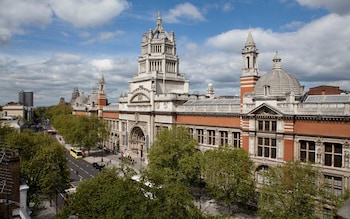Italy’s Prime Minister, Giorgia Meloni, vehemently denies she is anti-women, whilst a new survey of Italian men found that 80 per cent now describe themselves as feminists. During Mussolini’s occupation of Abyssinia there was a joke going around Britain. It went thus: What is the definition of an Abyssinian virgin? Answer: A goat that can run faster than an Italian soldier.
As jokes go, it is not up there with the greats, but it illustrates rather well the dilemma of modern Italy. There is nothing left of the Italian but his stereotype. This is evident in the arson of its opera houses like La Fenice, which has been burned down twice. The list of Italy’s neglected treasures is as long as the Catalogue aria. Cultural heritage receives only 0.35 per cent of the Italian state budget. This is the nub of the problem.
Most Italians are as little concerned with culture as Mussolini’s goat-chasing soldier. And why should they be otherwise? We make the error of confusing modern Italy with the ancient Roman Empire. Every Milanese clerk is expected to display a level of learning and sophistication appropriate to a descendant of Tacitus and Cicero.
But the modern Italian is very far from being the heir of Tacitus and Cicero. He is, in fact, descended from the slaves of these men, or from a ragbag of barbarian invaders such as the Goths and the Franks. Since Roman times, with the exception of Renaissance Tuscany, Italy has failed to distinguish herself — that is, apart from when she was under a foreigner. Nothing became the Italians so much as occupation. Before unification, it was the Habsburg monarchy that brought a semblance of order to northern Italy.
What of the south? In 1847, the writer Luigi Settembrini claimed that conditions there were worse than in Turkey. I said earlier that the Italians had nothing left but their stereotype, but they are in danger of losing even that. Until recently, feminism went unacknowledged. Most Italians, like Marcello Mastroianni’s character in La Dolce Vita, knew only three English phrases: “How are you?”, “I love you” and “Where is your hotel?” An Italian without amore is a bit like Athens without the Parthenon.
But most Italian men now seem content to be l’Uomo New. L’Uomo New even appears to have a leader. His name is Luciano Rossi. Mr Rossi, when I interviewed him on the telephone, told me that he was writing Italy’s first guide to New Manhood. One chapter would argue for men’s right to cry, another would be devoted to washing.
There would, however, be no advice on how to get a job. Rossi had identified what in the modern Italian is perhaps the only salient characteristic left over from the Ancients — the desire to be lazy. Fabius Maximus, who was in charge of the Roman forces during much of the Second Punic War was famous for his skill at not fighting it. Not for nothing was he nicknamed Cunctator, which means the delayer.
Disclaimer: The copyright of this article belongs to the original author. Reposting this article is solely for the purpose of information dissemination and does not constitute any investment advice. If there is any infringement, please contact us immediately. We will make corrections or deletions as necessary. Thank you.



